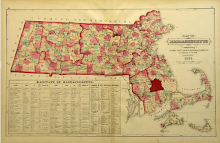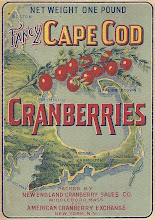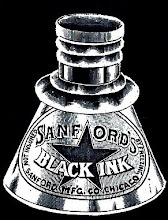| Lucy Morton Robinson, M. D., death notice, The Journal of the American Medical Association, 85: 132, July, 1925. |
Though Mertie E. Romaine's History of the Town of Middleboro states that Dr. Helen Ham of North Middleborough was the Town's first female physician, Dr. Ham in fact was preceded in that role by Dr. Lucy Morton Robinson (1840-1925), also of North Middleborough.
Lucy Robinson was born at North Middleborough, the fifth of eight children of Dr. Morrill and Mary (Shaw) Robinson. The elder Dr. Robinson, originally from Raynham, practiced medicine at Titicut from about 1828 until his death in 1873, and was a respected member of the North Middleborough community.
Undoubtedly inspired by her father, Lucy Robinson discovered an early avocation for medicine, and was probably encouraged by stories of pioneering women physicians such as Elizabeth and Emily Blackwell, and Marie Zakrzewska, as well as the foundation of groundbreaking institutions such as the New York Infirmary and New England Hospital for Women and Children, hospitals operated by female doctors for female patients.
Lucy Robinson's earliest medical studies were carried out under the tutelage of her father, who apparently believed firmly in the value of liberal education for women. (Another daughter, Sarah, was educated at Mount Holyoke Seminary).
 |
Women's Medical College of Pennsylvania, photograph, late 19th century. |
For a year, Dr. Robinson practiced at her home facing Titicut green, but, in 1889, she removed her practice to Brockton, locating an office on Main Street in the center of that city where she was located when she became licensed in 1894. Though there were a number of female physicians practicing at Brockton at that time, they were either midwives who confined their work solely to obstetrical cases, or women who practiced upon the fringes of accepted medicine (including two "clairvoyant" physicians and a "botanic" doctor). At the time of her death in 1925, Dr. Robinson was readily accepted as "Brockton's first woman physician."
In Brockton, Dr. Robinson's "work was especially helpful to the women of the community, and she had a large clientele in the outlying districts as well, where her unselfish work and sympathetic manner endeared her to her patients. She was always ready to respond to a call regardless of weather conditions."
In 1897, Dr. Robinson was listed in the Biographical Review of Plymouth County, a compendium of short biographical notices concerning the county's most notable personages, an indication of her stature, locally. Dr. Robinson never married, devoting her life's attention to the care and well-being of others.
Dr. Robinson's defiance of the common convention that the woman's place was in the home, helped subvert an increasingly anachronistic view and promoted the expansion of the women's rights movement from a campaign focused upon temperance and suffrage to one devoted to the achievement for all women of a meaningful place in society. While Dr. Robinson may have shared the vision of full equality for women articulated by Elizabeth Cady Stanton, Susan B. Anthony, Lucy Stone and others, hers was a more pragmatic course, demonstrating the possibility of integration in the areas of education, clinical training and professional service in medicine, and providing inspiration for the women who followed her in the serious study of medicine, and the other professions. In Middleborough, young women like Helen Ham and Ella Goodale would pursue medical careers in the decades following 1900, a course available to them because of women like Dr. Lucy Morton Robinson whose life was testament to the ideal that gender equality in medicine, in particular, and society, in general, was not only possible, but desirable.























+of+Smoky+Mountains+018.jpg)